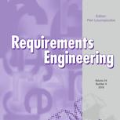[Context] Artificial intelligence (AI) components used in building software solutions have substantially increased in recent years. However, many of these solutions end up focusing on technical aspects and ignore critical human-centered aspects. [Objective] Including human-centered aspects during requirements engineering (RE) when building AI-based software can help achieve more responsible, unbiased, and inclusive AI-based software solutions. [Method] In this paper, we present a new framework developed based on human-centered AI guidelines and a user survey to aid in collecting requirements for human-centered AI-based software. We provide a catalog to elicit these requirements and a conceptual model to present them visually. [Results] The framework is applied to a case study to elicit and model requirements for enhancing the quality of 360 degree~videos intended for virtual reality (VR) users. [Conclusion] We found that our proposed approach helped the project team fully understand the needs of the project to deliver. Furthermore, the framework helped to understand what requirements need to be captured at the initial stages against later stages in the engineering process of AI-based software.
翻译:近年来,用于建立软件解决方案的人工智能(AI)组件大幅增加,然而,其中许多解决方案最终侧重于技术方面,忽视了关键的以人为本的方面。 [目标]在建立AI软件时,在需求工程(RE)中包括以人为本的方面,有助于实现更加负责、公正和包容的AI软件解决方案。 [方法]在本文件中,我们提出了一个基于以人为中心的AI准则制定的新框架,以及一项用户调查,以帮助收集以人为中心的AI软件的要求。我们提供了一份目录,以征求这些要求,并提供了一种概念模型,以直观地展示这些要求。 [Results]该框架用于案例研究,以征求和示范旨在提高360度虚拟现实用户的视频质量的要求。[结论]我们发现,我们拟议的方法有助于项目小组充分理解项目交付的需要。此外,该框架有助于了解在AI软件工程进程的后期阶段需要哪些要求。</s>




